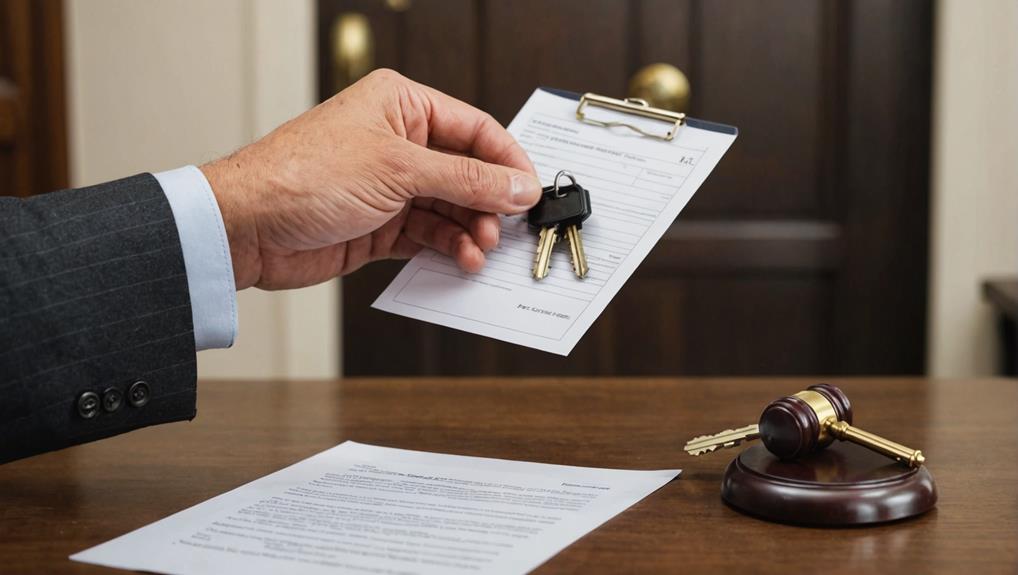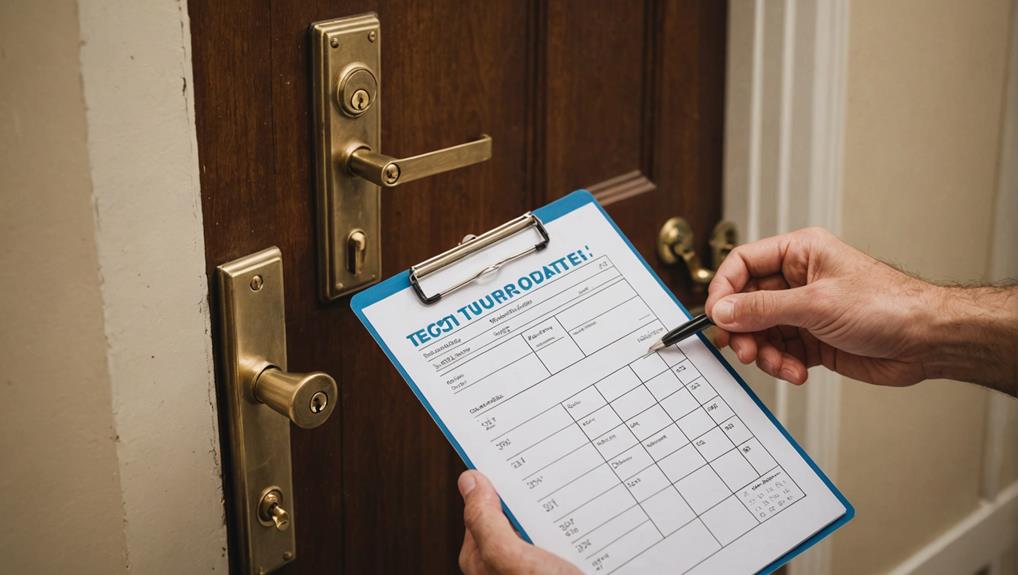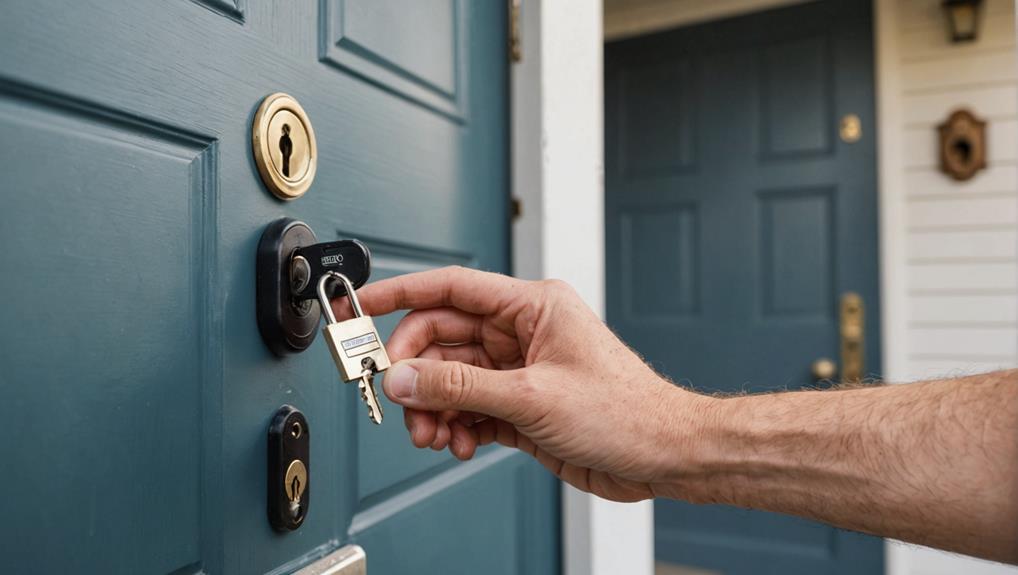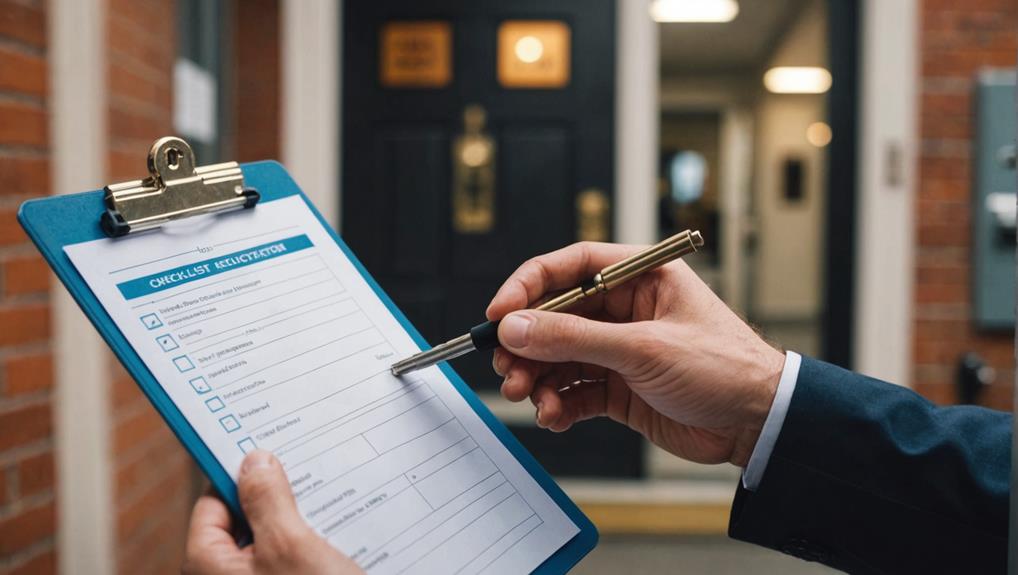You need to understand the legal requirements for re-keying after a tenant turnover, as these laws vary by state. Some states, like California, require immediate re-keying once a tenant moves out, while others, such as New York, mandate notifying outgoing tenants about security changes. It's essential to prioritize tenant safety by re-keying promptly to prevent unauthorized access. Failure to comply can lead to penalties and legal issues. Make sure you document each re-keying and communicate effectively with new tenants for transparency. There's a lot more to cover on this topic that can help you navigate these legal obligations effectively.
Key Takeaways
- Many states require landlords to re-key properties immediately or within a specific timeframe after a tenant vacates to ensure safety.
- Some states, like New York, mandate notification to outgoing tenants about re-keying for transparency and compliance.
- Documentation of re-keying activities is essential to avoid legal liabilities and to resolve potential disputes with tenants.
- Failure to comply with re-keying laws can result in financial penalties, litigation risks, and damage to the landlord's reputation.
- Landlords should establish clear re-keying policies and communicate them effectively to foster trust and enhance tenant safety.
Understanding State Laws
Understanding the legal landscape surrounding re-keying is vital, as laws can vary greatly from state to state. When you're involved in rekeying after tenant turnover, you must familiarize yourself with the specific state laws rekeying rental properties.
Understanding legal implications is essential, as each state has its own set of legal rekeying requirements that dictate when and how you should change locks to guarantee the safety of future tenants.
For instance, some states mandate that landlords rekey the property immediately after a tenant vacates, while others may allow a grace period. It's also important to know whether you need to notify the outgoing tenant or if you can change locks without prior consent.
This knowledge not only protects you legally but also demonstrates your commitment to tenant safety and satisfaction.
General Legal Obligations

Landlords often face general legal obligations when it comes to re-keying properties. One of the main responsibilities you have is ensuring the safety and security of your tenants. After a tenant turnover, lock rekeying is vital to prevent former tenants or unauthorized individuals from accessing the property.
Additionally, understanding the specific landlord responsibilities for lock replacement can help clarify your obligations in these situations. Failing to meet your landlord rekeying obligations can result in liability issues, potentially putting you and your tenants at risk.
In many situations, you're required to re-key the locks promptly after a lease ends. This not only protects the incoming tenants but also builds trust in your landlord-tenant relationships.
It's important to keep a record of all rekeying activities, including the dates and who performed the service. This documentation can serve as a safeguard should any disputes arise in the future.
Specific State Regulations

Each state has its own regulations governing re-keying practices, so it's vital to familiarize yourself with the laws applicable in your area. Some states require landlords to re-key the property within a specific timeframe after a tenant moves out, while others may have different stipulations.
For instance, in California, you're mandated to change the locks or provide new keys to the next tenant within a reasonable period. Meanwhile, New York has provisions guaranteeing that tenants receive notice of any re-keying. It's also important to understand how to navigate disputes regarding re-keying costs, as this can impact relationships with tenants and property managers navigating disputes.
Additionally, certain states may impose penalties for failing to comply with these regulations, which could affect your ability to serve future tenants effectively. It's also significant to check if there are any local ordinances that add further requirements.
Keeping up with these laws not only protects you legally but also enhances the trust and safety you provide to your tenants. Consider reaching out to a local attorney or real estate professional to clarify the regulations in your state. By staying informed, you facilitate a smoother change for new tenants and demonstrate your commitment to their well-being.
Best Practices for Landlords

Implementing best practices for re-keying not only protects your property but also fosters trust with your tenants. Start by establishing a clear re-keying policy that you can communicate to all tenants. This transparency shows that you prioritize their safety and security.
Understanding the importance of re-keying residential locks can further enhance your approach to tenant safety.
When a tenant moves out, make re-keying a top priority. Schedule the re-keying process promptly after they've vacated, ensuring the new occupants can move in with peace of mind. Always use a reliable locksmith to guarantee the job is done correctly, and consider upgrading to smart locks for added security and convenience.
Document each re-keying event, including the date and the locksmith used. This record can be beneficial if any disputes arise in the future.
Additionally, it's good practice to inform your new tenants that the locks have been changed, reassuring them that their safety is your concern.
Tenant Rights and Notifications

As a tenant, you have the right to be notified about any changes to your apartment's security, including re-keying procedures.
It's essential for landlords to communicate these changes effectively, guaranteeing transparency and trust.
Understanding the best practices for re-keying can help you feel more secure in your living environment.
It's important to understand how these notifications should be communicated to you and what security measures landlords must maintain.
Knowing your rights can help guarantee your living space remains safe and secure.
Tenant Notification Procedures
When a landlord decides to re-key a property, tenants have specific rights that must be respected. It's crucial to notify you about any changes that could affect your living situation.
Typically, landlords should provide written notice before re-keying, informing you of the scheduled date and time. This notice should be given within a reasonable timeframe, allowing you to prepare for the change.
Moreover, the notification should clearly outline the reasons for the re-keying, guaranteeing transparency in the process. It's your right to be informed about who'll access your unit during the re-keying, as well as the measures taken to protect your privacy.
In many jurisdictions, landlords are required to give at least 24 hours' notice before entering your unit—unless it's an emergency. Understanding these procedures helps you feel secure in your home.
If you have any concerns or feel that your rights aren't being respected, don't hesitate to communicate with your landlord. Open dialogue fosters a better relationship and guarantees that both parties are aware of their responsibilities during this change.
Right to Security Measures
After receiving notification about re-keying, it's significant to understand your right to security measures in your home.
As a tenant, you deserve to feel safe and secure in your living environment. When a landlord decides to re-key the property after a tenant turnover, it's not just a routine procedure; it's a vital step in protecting your privacy and safety.
You have the right to be informed about any changes that could affect your security. This includes knowing when the re-keying will occur and how it's being handled.
If you have any concerns or specific requests regarding the timing or method of re-keying, don't hesitate to communicate them to your landlord. It's your right to ask for the new keys promptly to make certain your home remains secure.
Moreover, if you notice any delays or lack of communication regarding the re-keying process, it's important to address these issues proactively.
Consequences of Non-Compliance

Not following re-keying laws can lead to serious legal liabilities for you as a landlord.
Regularly re-keying your locks is essential for safeguarding your property and maintaining tenant trust, as highlighted in essential tips for re-keying.
It also raises significant safety concerns for your tenants, putting you at risk for potential lawsuits.
On top of that, you could face hefty financial penalties that could impact your bottom line.
Legal Liabilities for Landlords
Landlords face significant legal liabilities if they fail to comply with re-keying regulations.
When you overlook your responsibility to re-key a property after a tenant leaves, you expose yourself to various potential consequences that can harm both your reputation and your finances.
Understanding these liabilities is essential for maintaining a safe and respectful environment for future tenants.
Here are three key legal liabilities you might encounter:
- Financial Penalties: You could face fines or other monetary penalties imposed by local housing authorities for non-compliance with re-keying laws.
- Litigation Risks: If a former tenant or a new tenant experiences issues due to your negligence, they might pursue legal action against you for damages, leading to costly legal fees and settlements.
- Loss of Rental License: In some jurisdictions, failing to adhere to safety regulations can result in the loss of your rental license, preventing you from renting properties in the future.
Tenant Safety Concerns
Neglecting re-keying responsibilities can lead to serious safety concerns for tenants. If you don't change the locks after a tenant moves out, you put new occupants at risk. Previous tenants or unauthorized individuals might still have access to the property, creating an environment of fear and insecurity. It's crucial to prioritize tenant safety and make certain they feel secure in their new home.
Consider the following table to understand the potential consequences of non-compliance:
| Safety Concern | Impact on Tenants |
|---|---|
| Unauthorized Access | Increased risk of theft or harm |
| Emotional Distress | Anxiety and fear in new living environment |
| Loss of Trust in Landlord | Deterioration of tenant-landlord relationship |
Financial Penalties Incurred
Failing to adhere to re-keying laws can lead to significant financial penalties for property owners. Ignoring these regulations not only jeopardizes tenant safety but can also impact your bottom line.
You want to provide a secure environment for your tenants, but neglect may result in serious consequences that can affect your reputation and finances.
Here are three potential financial penalties you could face:
- Fines and Fees: Local authorities may impose hefty fines for non-compliance, which can add up quickly and strain your budget.
- Legal Costs: If a tenant decides to take legal action due to safety concerns, you could incur substantial legal fees that could have been avoided with proper re-keying.
- Increased Insurance Premiums: Non-compliance can lead to higher insurance premiums or even difficulty obtaining coverage, which can ultimately affect your cash flow.
Frequently Asked Questions
How Often Should I Re-Key My Rental Properties?
You should consider re-keying your rental properties whenever there's a tenant turnover or if you suspect unauthorized access.
It's a good practice to guarantee the safety and security of your current tenants. Regularly reassessing the locks every few years can also help maintain security.
If you've had issues with lost keys or past tenants not returning them, re-keying more frequently might be wise.
Keeping your properties secure ultimately fosters trust and peace of mind for everyone involved.
Can Tenants Request a Key Change During Their Lease?
Ever felt uneasy about your security?
Tenants can indeed request a key change during their lease. If they're concerned about safety or unauthorized access, it's perfectly reasonable for them to ask.
As a landlord, consider their request seriously; it shows you care about their well-being. Open communication fosters trust.
Just remember, you might want to discuss any potential costs and guarantee everyone knows the new key policy moving forward.
Are There Fees Associated With Re-Keying for Landlords?
When it comes to re-keying, you might find that landlords often charge fees to cover the costs involved.
These fees can vary based on the complexity of the job or the type of lock being used.
It's important to communicate openly with your landlord about any potential fees before proceeding.
This way, you can avoid surprises and guarantee both parties feel comfortable with the arrangements.
Transparency can build a better relationship overall!
What Materials Are Best for Re-Keying Locks?
When you're considering re-keying locks, opt for high-quality materials like durable brass or stainless steel.
These materials resist wear and tear, ensuring long-lasting security.
You'll also want to invest in a reliable re-keying kit that matches your lock type.
This way, you can easily change the pins and tumblers.
Can I Use My Personal Locksmith for Re-Keying?
Imagine your home as a cozy café, where every customer deserves a warm welcome.
You can definitely use your personal locksmith for re-keying. Choosing someone you trust not only makes the process smoother but also guarantees your peace of mind.
Just like a barista knows their regulars, your locksmith understands your security needs.
Conclusion
In summary, re-keying after a tenant turnover isn't just a good idea; it's often a legal requirement. For instance, if you fail to re-key after a tenant leaves, you might face legal trouble if the former tenant retains a key. By understanding your state laws and following best practices, you protect your property and guarantee a smooth changeover for new tenants. Remember, staying compliant keeps you and your tenants safe and secure.









